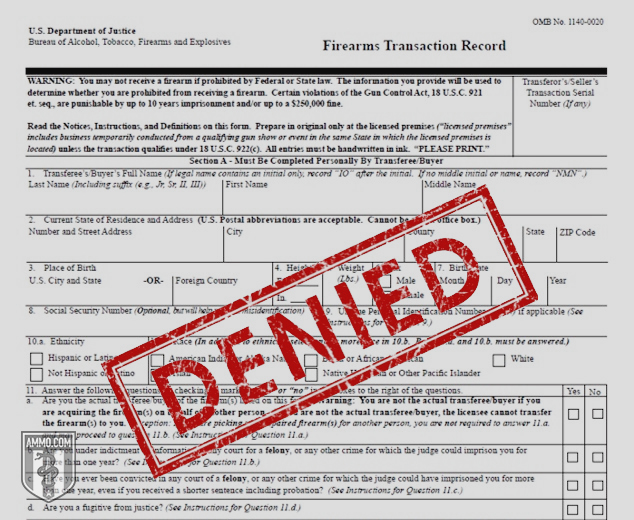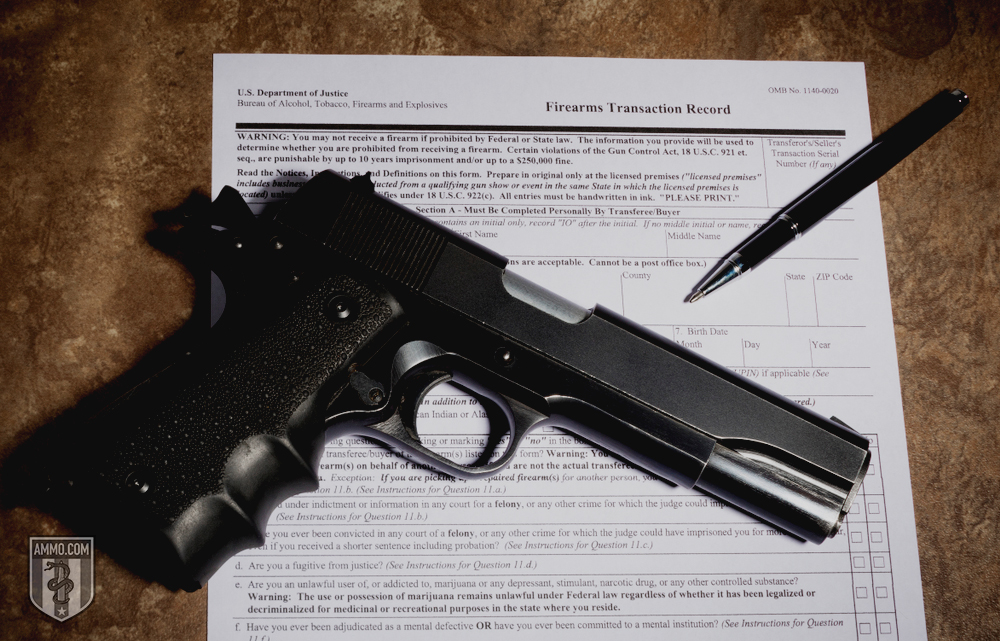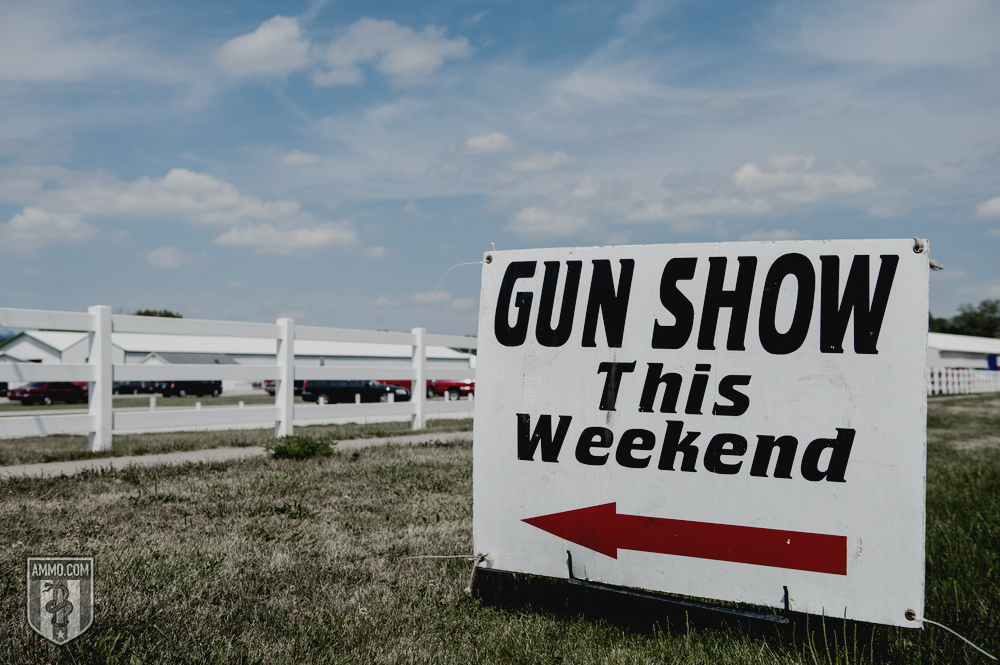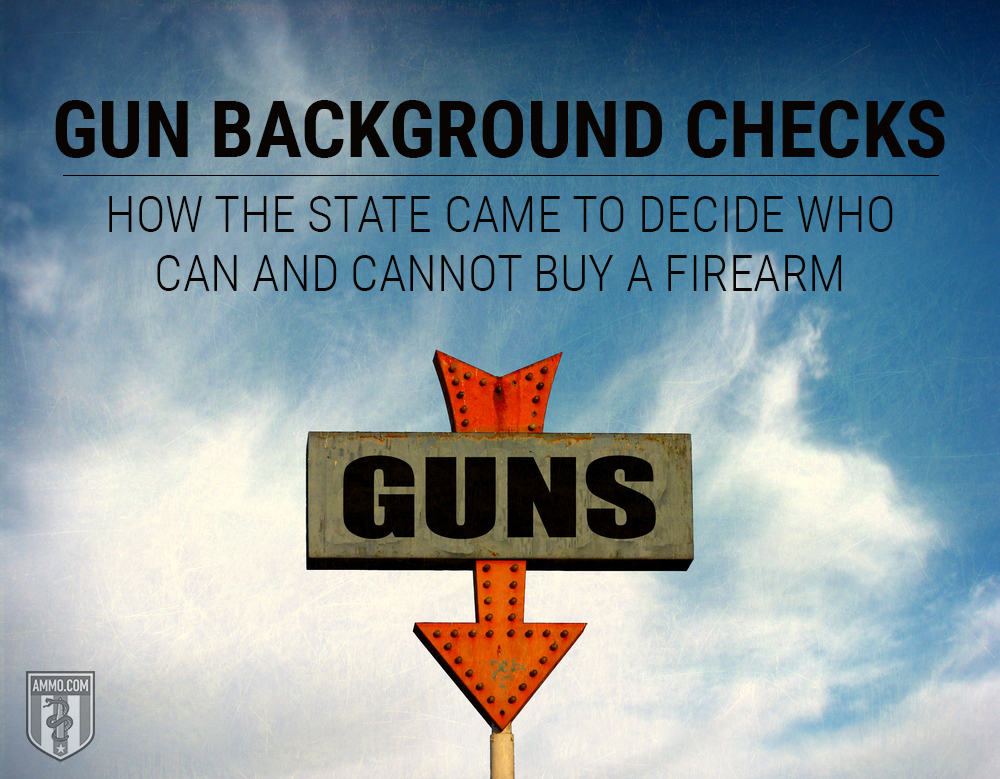Prior to 1968, most adults in the United States could purchase a firearm without state interference. Guns were available in local retail stores, as well as mail-order catalogs, and as long as you hadn’t been convicted of a felony and you had the funds, there weren’t any questions asked.
Things are different now. Depending on where in America you are and what type of gun you want to buy, there’s a good chance you’ll need to pass a NICS-mandated background check to complete your purchase.
Although many people hold a strong opinion for and against gun background checks, they’ve proven to be an integral part of the state’s gun control apparatus – and they don’t appear to be leaving anytime soon.
Since background checks are such a requirement for today’s gun enthusiasts, it’s important for gun owners (and those who may someday be gun owners) to understand everything they can, including how the current system works and how it came to be.
The History of Gun Background Checks in the U.S.
The history of background checks for gun purchases reaches back to the first restrictions placed on individuals trying to purchase firearms. Here in the U.S., this occured after the Civil War, when several southern states adopted “Black Codes,” which replaced the prior slave codes and worked to suppress the freedoms of black Americans. Among other restrictions, the Black Codes forbade African-Americans from owning firearms.
The Federal Firearms Act of 1938 began restricting the sales of firearms, requiring those in the business of selling firearms to purchase a Federal Firearms License (FFL) and maintain a list of persons who purchased firearms, including their name and address. The Firearms Act of 1938 also listed convicted felons as the first prohibited persons – who are not allowed, by law, to own, purchase, or possess firearms.
And then something happened that would forever change American history. Six days before Thanksgiving, on November 22, 1963, President John F. Kennedy was assassinated by Lee Harvey Oswald in Dallas using a Mannlicher-Carcano rifle that was chambered in 6.5x52mm Carcano and fitted with a telescopic sight, which he’d purchased from a mail-order catalog.
The 1963 Kennedy assassination was followed by additional high-profile assassinations over the next 5 years:
February 21st, 1965: Malcolm X was assassinated by three members of the Nation of Islam who bull-rushed him on-stage during a speech in Harlem with a 12-gauge sawed-off shotgun and handguns chambered in .45 ACP and 9mm. X had publicly broken away from the Nation of Islam and was openly critical of its leader, Elijah Muhammad.
April 4th, 1968: Martin Luther King Jr. was assassinated by escaped convict James Earl Ray using a .30-06 caliber rifle in Memphis. The prior year Ray had broken out of the Missouri State Penitentiary by hiding in a bread delivery truck. Ray was a notorious escape artist and career criminal who used an alias when purchasing the rifle.
(After the assassination, investigators launched a sixty-five day manhunt for King’s assassin that led them across two continents and four countries which culminated in Ray’s arrest at London’s Heathrow airport where he was caught traveling on a forged Canadian passport. A decade later in 1979, Ray again broke out of jail – this time escaping from Tennessee’s most notorious maximum security prison, Brushy Mountain State Penitentiary, where he was serving a life sentence for King’s assassination.)
June 5th, 1968: Two months after King’s assassination in Memphis, Democratic presidential candidate Robert F. Kennedy (JFK’s younger brother) was assassinated by Palestinian-born Sirhan Bishara Sirhan in Los Angeles using a revolver chambered in .22. Earlier that day, Kennedy had won the South Dakota and California presidential primaries. Sirhan claimed to be part of an occult organization called the Rosicrucians.
The cumulative effect of these assassinations – along with the emergence of the Black Panthers, who’d started hanging out at government buildings armed to the teeth – led to the Gun Control Act of 1968, which was specifically intended to keep “firearms out of the hands of those not legally entitled to possess them because of age, criminal background, or incompetence.”
Through the Gun Control Act of 1968, the federal government placed restrictions on the sale of firearms across state lines and expanded the prohibited persons who were not allowed to purchase or possess firearms. Under the new law, gun purchases became illegal for those who were:
- Convicted of a non-business-related felony
- Found to be mentally incompetent
- Users of illegal substances
To determine this information, those who wished to purchase a firearm from an FFL had to complete a questionnaire of yes/no questions such as “Are you a convicted felon?” and “Are you a fugitive from justice?” Although these questions needed to be answered, they did not require verification from the gun seller.
In 1972, the Bureau of Alcohol, Tobacco, Firearms and Explosives (ATF) was formed as a way to help control the illegal sales and use of firearms.
In March of 1981, the assassination attempt of President Ronald Reagan led to further gun legislation with the Brady Handgun Violence Prevention Act of 1993, which amended the Gun Control Act of 1968 to now require background checks for the purchase of firearms from a retailer. The Brady Act, as it’s known today, also led to the development of the National Instant Criminal Background Check System (NICS), which launched in 1998, and is the current law on background checks for gun purchases in the U.S.
The National Instant Criminal Background Check System

Located at the FBI’s Criminal Justice Information Services Division in Clarksburg, West Virginia, the NICS is currently used by 30 states and five districts, as well as the District of Columbia, to check the backgrounds of those who wish to purchase firearms. Those states that opt not to use the NICS have their own point of contact (POC) to complete background checks.
The NICS applies a person’s identifying characteristics, including name and date of birth, to its own index, as well as the National Crime Information Center (NCIC) database and the Interstate Identification Index. These systems compare the intended purchaser’s demographic information against the national databases to see if they match someone deemed a prohibited person. Prohibited persons include those who are or were:
- Convicted of a crime punishable by imprisonment for a year or more
- Fugitives from justice
- A user of or addicted to a controlled substance
- Adjudicated as a mental defective or been committed to a mental health institution
- Illegal aliens
- Aliens admitted to the U.S. under a nonimmigrant visa
- Discharged from the U.S. Armed Forces under dishonorable conditions
- Renounced their citizenship to the U.S.
- Subject to a court order that restrains their interactions with an intimate partner or child
- Convicted of domestic violence
Since its conception, NICS has completed over 300 million background checks and has issued more than 1.3 million denials. The NICS is available 17 hours a day, seven days a week, except for Christmas Day.
How Do Background Checks Work?
When you visit a gun store and attempt to purchase a firearm, you must complete a Firearm Transaction Record, or ATF Form 4473 – which requires the intended purchaser’s name, address, and birthdate. The form also requires a government-issued photo ID and asks questions regarding the individual’s appearance, including height and weight.
Once the form’s completed, the gun seller can either call the 1-800 number for NICS or use the online system to run the background check. In over 90 percent of the cases, the results are almost immediate, with the system either approving, delaying, or denying the purchase within minutes.
With an approval, the sale can immediately proceed as planned with you purchasing the firearm. If there is a delay, the NICS and FBI investigate the inquiry over the next three days. If the FFL does not hear anything within that time period or if a determination cannot be made, then the retailer can, but does not have to, continue with the firearm transfer. When this occurs, it’s often referred to as a “default proceed” sale.
When a denial is made, which occurs in only about 2 percent of background checks, the retailer is unable to sell or transfer the firearm to the individual in question. You must submit a request to the NICS to receive the reason for your denial, the most common of which is a history of a felony conviction.
If you believe you were given an erroneous denial, you can appeal the decision by completing a Voluntary Appeal File (VAF), which can be done online or by mailing your request to the FBI. Along with the VAF application, you will also need to be fingerprinted to move forward with the appeal process.
When is a Background Check Needed to Purchase a Gun?

It doesn’t matter if you purchase the firearm in a brick-and-mortar store, a gun show, online, or through a magazine – if the seller is a retailer provider (i.e. has an FFL), then the background check must occur.
When is a Background Check Not Needed to Purchase a Gun?
Under federal law, any adult can sell a personally owned firearm to another adult in the same state as long as you know, to the best of your ability, that they’re allowed to own a firearm.
Private sellers aren’t required to ask for identification, they don’t have to complete any forms, nor keep any records of the transaction. What’s more, federal law does not mandate a background check to purchase a firearm from a private seller. This includes buying a gun from a relative, a neighbor, or a friend.
Although federal law does not demand a background check for the private sale of firearms, some states do require a background check.
If you inherit or are gifted a firearm, you don’t need a background check.
Do Gun Background Checks Differ By State?
Thirty states, five districts, and D.C. all rely solely on the NICS for gun background checks. The following 13 states use their own full point of contact (POC) data system for gun background checks and do not use the FBI’s system:
- California
- Colorado
- Connecticut
- Florida
- Hawaii
- Illinois
- Nevada
- New Jersey
- Oregon
- Pennsylvania
- Tennessee
- Utah
- Virginia
Some states, namely Maryland, New Hampshire, Washington, and Wisconsin, use NICS for long guns, but a state program for background checks on handguns. Iowa, Nebraska, and North Carolina use NICS, but have a partial POC for background checks in relation to handgun permits.
Many of these states have added their own provisions to their background checks, on top of what federal law mandates. In most cases, they also include looking at state and local records to determine if the person in question should or should not be allowed to own a firearm.
Some states have implemented universal background checks via an FFL, even during a private gun sale. While Maryland and Pennsylvania require background checks for all handgun transfers, regardless of retail or private sale, the following states require a background check for all firearm transfers:
- California
- Colorado
- Connecticut
- Delaware
- District of Columbia
- Nevada
- New Jersey
- New York
- Oregon
- Rhode Island
- Vermont
- Washington
In addition, some states require permits to purchase firearms. Hawaii, Illinois, and Massachusetts require a permit for all gun purchases, while Iowa, Michigan, Nebraska, and North Carolina require a permit for purchasing a handgun. These permits often require their own background check as well.
It should be noted that although these laws exist in Nebraska, they’re not currently being enforced, but are expected to be by January of 2020.
But Isn’t There a Gun Show Loophole?

So if you purchase a firearm from a gun seller with an FFL at a gun show, you will need to complete Form 4473 and have a background check. Under federal law, if you purchase a gun from a private seller at a gun show, you don’t need to have a background check. Your state laws may differ.
Of the average 4,000 gun shows in the U.S. each year, it’s estimated that 50 to 75 percent of vendors have an FFL, and therefore require purchasers of firearms to complete background checks. But that doesn’t mean that 25 to 50 percent of vendors are private sellers of firearms – many of these are vendors that sell gun paraphernalia. Gun shows are filled with vendors who sell everything from t-shirts and ball caps to holsters and concealed carry gear, and it’s these sellers that make up the majority of the remaining non-licensed vendors.
Are there private gun sellers at gun shows? Absolutely. But the idea that criminals are flocking to gun shows to illegally purchase firearms is untrue. In a report by the Bureau of Justice Statistics, only 0.7 percent of convicted criminals purchased their firearms at gun shows.
Have Background Checks Stopped Gun Violence and Crimes?
The research on the effectiveness of background checks to stop gun violence shows conflicting evidence. In an October 2018 published study completed by U.S. Davis and Johns Hopkins Bloomberg School of Public Health, in the 10 years following California’s comprehensive background checks, the number of gun homicides and suicides were not impacted. In a similar study published in July of the same year, gun violence did not increase with the repeal of comprehensive background checks.
Yet other studies show that background checks do reduce violence. A 2015 study found that requiring Connecticut handgun owners to go through a background check led to a 40-percent decline in gun homicides and suicides over a 10-year period.
This contradicting research shows that the problem of criminals getting their hands on guns can’t be stopped by mere background checks. According to the Department of Justice Special Report on Firearm Violence, 77 percent of state prisoners associated with firearm crimes received their firearm through:
- Theft
- Black market
- Drug dealer
- On the street
- Family or friends
Not one of these criminals would have been affected by background checks, universal or otherwise. After all, most criminals don’t feel obligated to use legal means to obtain their firearms since they’ve either broken laws previously or plan to do so.
Beyond theft and the black market, criminals also use straw purchases, which are illegal, to get their hands on firearms. Straw purchasers are people who can pass a background check and intentionally purchase firearms for criminals. The San Bernardino terrorists used a straw purchaser to get the firearms they used to kill 14 people in the 2015 mass shooting.
Background checks for gun purchases often become a talking point after these types of events, but those who partake in this terroristic activity often don’t have criminal histories that would flag a background check. For instance, the Virginia Tech madman legally purchased a gun at a Virginia-based FFL and passed his background check before using it to shoot fellow students.
And then there’s the fact that sometimes the background check system fails. NICS is not a 100-percent absolute system, and time has shown that gun background checks can only be as reliable as the records they contain. Devin Kelley, the Texas Church madman, was prohibited by law to own or purchase a firearm because of a domestic violence conviction while in the Air Force. Yet Kelley purchased four firearms between 2014 and 2017, completing Form 4473 and being approved each time by NICS.
In this case, the Air Force failed to report the court martial to the FBI’s National Crime Information Center, which the NICS relies on for information. So, again, the system is only as good as the information it contains.
(It’s also worth pointing out that Kelley’s murderous rampage was stopped by a private citizen, a plumber named Stephen Willeford, who legally owned an AR-15. Kelley was shot in the leg and torso by Willeford, stopping him from murdering more people inside that church before the police could arrive.)
And whereas sometimes the system on which gun background checks rely is incomplete, in other instances it produces false positives. In other words, law-abiding citizens get incorrectly matched by NICS, or their respective state-level POC data system, with criminals who have similar names. And if that happens to you, then you could be denied your right to own a gun because of a bureaucratic error. Estimates from the Crime Prevention Research Center pointed to 93 percent of initial NICS denials turning out as false positives in 2009, with similar estimates in 2010. (The Obama administration quit reporting these statistics after 2010.) Yes, individuals can appeal this denial and restore their gun rights, but dealing with bureacracy can be an expensive hassle.
The myriad of issues with NICS is why the National Shooting Sports Foundation (NSSF), a trade association representing the firearms industry, launched FixNICS.org in 2013. It is also why the NSSF publishes a yearly ranking of the states based on the number of mental health records they provide relative to their population – to encourage the states to comply with existing federal law, and submit any and all records establishing an individual as a prohibited person to the FBI’s databases. Their goal is to improve the existing system for everyone so that gun background checks are more accurate and complete.
Whether you like them or not, background checks are here to stay for gun owners and gun purchasers – but they are not the saving grace that some make them out to be. Background checks for gun purchases can only do so much and are not the permanent solution to keeping guns out of the hands of criminals and keeping Americans safe from gun violence. More concerning is that they give the state an ever-growing list of private citizens who own guns, and such a list has historically been used for subsequent gun confiscation attempts.
“Gun Background Checks: How the State Came To Decide Who Can and Cannot Buy a Firearm” originally appeared in the Resistance Library on Ammo.com.































